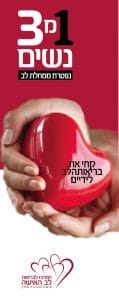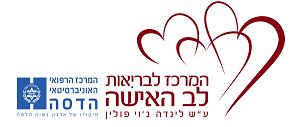Heart Disease in Women: Getting women to seek help
Over the last 15 years, the death rate from heart disease has decreased in women in the United States and Israel. Despite the improvement, on the last census report, more women died from  cardiovascular disease in Israel than from all the different types of cancer put together. Heart attacks are increasing in young women, likely due to smoking and diabetes. A woman who has a heart attack is 3 times more likely to die after her heart attack than a man. One major fact stands out- a woman with the symptoms of a heart attack takes 59 minutes longer to call for help. Those 59 minutes translate into heart damage and ultimately reduced survival.a
cardiovascular disease in Israel than from all the different types of cancer put together. Heart attacks are increasing in young women, likely due to smoking and diabetes. A woman who has a heart attack is 3 times more likely to die after her heart attack than a man. One major fact stands out- a woman with the symptoms of a heart attack takes 59 minutes longer to call for help. Those 59 minutes translate into heart damage and ultimately reduced survival.a
Data from surveys suggests that in the United States, there is increased awareness of heart disease in women. 55% of women were aware that heart disease is the leading cause of death in women. In Israel, the numbers are far lower; on our survey only 38% of Israeli women were aware that heart disease is a leading cause of death in women, and only 26% of Arab Israeli women were aware. What has significantly improved is awareness in health care providers. On a recent survey in the United States, 82% of cardiologists felt well-prepared or extremely well prepared to assess heart disease in women, and only 5% of primary care providers felt inadequately prepared. More than 90% of cardiologists and primary care providers agreed that women can present with different signs and symptoms of heart disease than men. As a result, women who have chest pain are more likely to be evaluated for heart disease and women are now almost as likely as men to undergo cardiac catheterization when they have a cardiac event. In Israel, there is still a difference between men and women in terms of the amount of time it takes from when they seek medical attention until they arrive in the catheterization laboratory, but that differences is now much much less.a
Why do women take longer to seek help?a
Studies of women who have experienced heart attacks have found that even when the patient knows that she is experiencing chest pain and that chest pain is associated with myocardial infarction, denial of the severity or seriousness of symptoms will lead to delay in seeking care. Women who frequently experience pain may take pain relievers and then wait to see if they work. The requirements of caregiving may also interfere with help seeking, as well as the fear of being perceived as hysterical and being dismissed by medical staff. The woman may attribute the signs and symptoms of the heart attack to anxiety, and anxiety itself can interfere with taking immediate action. In another survey that we conducted, we found that 27% of respondents cited concern about the expense of ambulance and/or medical care as a major concern leading to delay. a
What can we do?a
Campaigns to reduce delays in seeking help for acute myocardial infarction have been mostly unsuccessful. So far, qualitative data suggests that the intensity of the discomfort is the main trigger  for seeking help. We are in the process of another study designed to learn more about what prompts a woman to call for help, so that we can use these findings to design an effective campaign to decrease waiting time.a
for seeking help. We are in the process of another study designed to learn more about what prompts a woman to call for help, so that we can use these findings to design an effective campaign to decrease waiting time.a
We need a campaign that specifically address the denial mechanisms, the fears, and gender-specific concerns. We need to target women with less education and minority women, as these populations frequently delay getting help. We need a clear message about what are the primary symptoms of a heart attack: chest pain, discomfort in the jaw, neck, arms, or between the shoulder blades, shortness of breath and indigestion. Educating family members may also increase the likelihood of timely evaluation. But ultimately, we need to empower the women themselves to get help when they need it.a
When a man has chest pain, we immediately think that it might be a heart attack. When a woman has chest pain, she needs not only to consider that it might be a heart attack but also to ACT. Even though the vast majority of chest pain does not represent a heart attack, the person experiencing a cardiac event usually knows that something is seriously wrong. We need to transform that feeling into action. Calling for help is not a sign of weakness but of empowerment.a
If you have chest pain, shortness of breath, discomfort in the arms, neck or jaw or between the shoulder blades, and this discomfort is different than what you have experienced in the past, call for help. This is true for men and for women, at any age and at any time. If your heart is calling for help, get your heart the help it needs. Call an ambulance.a
Search
Recent Posts
Abuse and Heart Disease
Abuse and Heart Disease: Exposure to trauma and...The Fake News Fiasco
We are exposed to a tremendous amount of inform...Coaching For Change
The Pollin Center’s health coaching group is an...When on-line is off limits: Innovative Corona-tailored health promotion program for Ultra-orthodox women – Chevruta L’Chaim
Ultra-Orthodox (Haredi) women have worse health...21444
The stress, apprehension and the fears coupled ...
